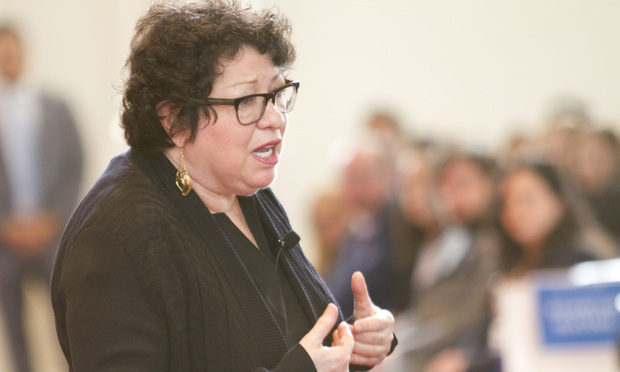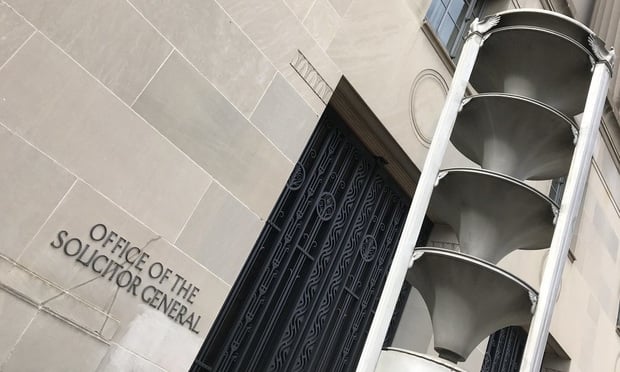Sotomayor Denounces 'Injustice' as Court Broadens Bias Shield for Religious Schools
"The court is not only wrong on the facts, but its error also risks upending antidiscrimination protections for many employees of religious entities," Justice Sonia Sotomayor said in her dissent. The court ruled 7-2, led by Justice Samuel Alito Jr., to extend job bias laws for church-run schools.
July 08, 2020 at 03:06 PM
5 minute read
 Justice Sonia Sotomayor. Photo: John Disney/ALM
Justice Sonia Sotomayor. Photo: John Disney/ALM
The U.S. Supreme Court's Wednesday decision extending an exemption from federal job bias laws for church-run schools will open the door to discrimination against thousands of lay teachers, charged a dissenting Justice Sonia Sotomayor.
A 7-2 majority, led by Justice Samuel Alito, ruled that whether religious school teachers fall under the so-called "ministerial exception" depends "at bottom" on the scope of an employee's work.
In the case of two elementary Catholic school teachers who claimed they were fired because of age and disability discrimination, Alito wrote: "As elementary school teachers responsible for providing instruction in all subjects, including religion, they were the members of the school staff who were entrusted most directly with the responsibility of educating their students in the faith. A religious institution's explanation of the role of its employees in the life of the religion in question is important."
But Sotomayor, joined by Justice Ruth Bader Ginsburg, disagreed. The majority reached its result "even though the teachers taught primarily secular subjects, lacked substantial religious titles and training, and were not even required to be Catholic," Sotomayor said.
The two dissenters warned that the majority's "apparent deference here threatens to make nearly anyone whom the schools might hire 'ministers' unprotected from discrimination in the hiring process. That cannot be right." Sotomayor added, "The inherent injustice in the court's conclusion will be impossible to ignore for long, particularly in a pluralistic society like ours."
The decision was the third in a religion-related case this term in which the justices ruled in favor of the party pressing a religious discrimination claim. The other two were Wednesday's ruling in Little Sisters of the Poor v. Pennsylvania, which upheld the Trump administration's effort to restrict access to contraceptives under Obamacare; and last week's decision in Espinoza v. Montana Dept. of Revenue, concerning a tax credit program restricting scholarships to parents of children attending religious schools. Sotomayor and Ginsburg dissented in both cases.
In the 2012 case Hosanna-Tabor Evangelical Lutheran Church v. EEOC, the high court unanimously ruled for the first time that the First Amendment bars employment discrimination claims when the employer is a religious group and the employee is one of the group's "ministers." The opinion, written by Chief Justice John Roberts Jr., used a multifactor analysis to decide whether the exception applied.
In the combined cases decided Wednesday—Our Lady of Guadalupe v. Morrissey-Berru, St. James School v. Biel—the justices were asked to revisit how the ministerial exception should be applied.
Agnes Morrissey-Berru claimed her teaching contract was not renewed because of her age. Kristen Biel, whose teaching contract was not renewed shortly after she informed the school that she needed time off for breast cancer surgery and chemotherapy, died last summer. Her husband, representing her estate, was the respondent in the high court case. The U.S. Court of Appeals for the Ninth Circuit ruled in favor of both employees based on the totality of the circumstances surrounding their jobs.
The U.S. Equal Employment Opportunity Commission supported Biel's disability job bias claim in the lower courts as her religious school employer sought to bar it. But with a change in administrations, the agency's support vanished at the U.S. Supreme Court.
In the high court, the schools argued that the ministerial exception applies when the employee carried out important religious functions, including leadership, worship, ritual and expression. Eric Rassbach of the Becket Fund for Religious Liberty argued on behalf of both schools. Stanford Law School's Jeffrey Fisher represented Biel and Morrissey-Berru.
 Solicitor General's office at Main Justice in Washington. Photo: Mike Scarcella/NLJ
Solicitor General's office at Main Justice in Washington. Photo: Mike Scarcella/NLJThe Justice department, represented by Morgan Ratner, an assistant to the solicitor general, contended that the ministerial exception applies to any employee "who preaches a church's beliefs, teaches its faith, or carries out its religious mission." In close cases, the government argued, "facts that demonstrate a religious organization sincerely regards its employee as performing such important religious functions should be dispositive."
Daniel Mach, director of the ACLU Program on Freedom of Religion and Belief, said the Supreme Court passed up an opportunity to "adopt a robust and nuanced test to govern these disputes, one that would have preserved religious institutions' ability to choose their ministers while also protecting the vast majority of employees from invidious discrimination."
Mach added: "Instead, the court appears to defer largely to the say-so of schools, essentially offering them a rubber stamp for discrimination."
Notre Dame Law School's Richard Garnett said in a statement: "Today's important decision does not mean, as some suggest, that religious institutions are above the law or that they have a 'license to discriminate.' It means, instead, that a crucial dimension of our Constitution's religious-freedom guarantee is that civil powers are limited to civil matters and that state lacks authority to second-guess religious decisions and doctrines."
Sotomayor called the majority decision "profoundly unfair." She continued: "The court is not only wrong on the facts, but its error also risks upending antidiscrimination protections for many employees of religious entities."
This content has been archived. It is available through our partners, LexisNexis® and Bloomberg Law.
To view this content, please continue to their sites.
Not a Lexis Subscriber?
Subscribe Now
Not a Bloomberg Law Subscriber?
Subscribe Now
NOT FOR REPRINT
© 2025 ALM Global, LLC, All Rights Reserved. Request academic re-use from www.copyright.com. All other uses, submit a request to [email protected]. For more information visit Asset & Logo Licensing.
You Might Like
View All
LSU General Counsel Quits Amid Fracas Over First Amendment Rights of Law Professor
7 minute read
What’s at Stake in Supreme Court Case Over Religious Charter School?

Supreme Court Takes Up Case Over Approval of Religious Charter School
Trending Stories
- 1Public Notices/Calendars
- 2Wednesday Newspaper
- 3Decision of the Day: Qui Tam Relators Do Not Plausibly Claim Firm Avoided Tax Obligations Through Visa Applications, Circuit Finds
- 4Judicial Ethics Opinion 24-116
- 5Big Law Firms Sheppard Mullin, Morgan Lewis and Baker Botts Add Partners in Houston
Who Got The Work
J. Brugh Lower of Gibbons has entered an appearance for industrial equipment supplier Devco Corporation in a pending trademark infringement lawsuit. The suit, accusing the defendant of selling knock-off Graco products, was filed Dec. 18 in New Jersey District Court by Rivkin Radler on behalf of Graco Inc. and Graco Minnesota. The case, assigned to U.S. District Judge Zahid N. Quraishi, is 3:24-cv-11294, Graco Inc. et al v. Devco Corporation.
Who Got The Work
Rebecca Maller-Stein and Kent A. Yalowitz of Arnold & Porter Kaye Scholer have entered their appearances for Hanaco Venture Capital and its executives, Lior Prosor and David Frankel, in a pending securities lawsuit. The action, filed on Dec. 24 in New York Southern District Court by Zell, Aron & Co. on behalf of Goldeneye Advisors, accuses the defendants of negligently and fraudulently managing the plaintiff's $1 million investment. The case, assigned to U.S. District Judge Vernon S. Broderick, is 1:24-cv-09918, Goldeneye Advisors, LLC v. Hanaco Venture Capital, Ltd. et al.
Who Got The Work
Attorneys from A&O Shearman has stepped in as defense counsel for Toronto-Dominion Bank and other defendants in a pending securities class action. The suit, filed Dec. 11 in New York Southern District Court by Bleichmar Fonti & Auld, accuses the defendants of concealing the bank's 'pervasive' deficiencies in regards to its compliance with the Bank Secrecy Act and the quality of its anti-money laundering controls. The case, assigned to U.S. District Judge Arun Subramanian, is 1:24-cv-09445, Gonzalez v. The Toronto-Dominion Bank et al.
Who Got The Work
Crown Castle International, a Pennsylvania company providing shared communications infrastructure, has turned to Luke D. Wolf of Gordon Rees Scully Mansukhani to fend off a pending breach-of-contract lawsuit. The court action, filed Nov. 25 in Michigan Eastern District Court by Hooper Hathaway PC on behalf of The Town Residences LLC, accuses Crown Castle of failing to transfer approximately $30,000 in utility payments from T-Mobile in breach of a roof-top lease and assignment agreement. The case, assigned to U.S. District Judge Susan K. Declercq, is 2:24-cv-13131, The Town Residences LLC v. T-Mobile US, Inc. et al.
Who Got The Work
Wilfred P. Coronato and Daniel M. Schwartz of McCarter & English have stepped in as defense counsel to Electrolux Home Products Inc. in a pending product liability lawsuit. The court action, filed Nov. 26 in New York Eastern District Court by Poulos Lopiccolo PC and Nagel Rice LLP on behalf of David Stern, alleges that the defendant's refrigerators’ drawers and shelving repeatedly break and fall apart within months after purchase. The case, assigned to U.S. District Judge Joan M. Azrack, is 2:24-cv-08204, Stern v. Electrolux Home Products, Inc.
Featured Firms
Law Offices of Gary Martin Hays & Associates, P.C.
(470) 294-1674
Law Offices of Mark E. Salomone
(857) 444-6468
Smith & Hassler
(713) 739-1250









